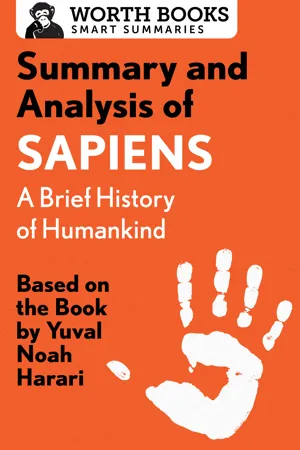Summary
1. An Animal of No Significance
Homo sapiens (“wise man”), the only surviving species of humans, originated in East Africa 150,000 years ago, and lived simultaneously with many humans, but was an insignificant species, compared to the powerful apes that were its direct ancestors.
However, Sapiens’s larger brain and upright posture helped it win the struggle for survival, as did its use of tools and discovery of fire. Moving north into Eurasia, Sapiens encountered the Neanderthals, whom they succeeded in displacing, either by intermingling with, or destroying them. “Tolerance is not a Sapiens trademark,” Harari says, making the first of many links between human evolution and modern social history.
2. The Tree of Knowledge
The Cognitive Revolution occurred about 70,000 years ago, when Sapiens acquired language, its most useful tool. Verbal communication permitted humans to connect over real things—approaching lions, tribal gossip—but more importantly, about things that didn’t exist: deities or shared beliefs, which are the basis of primitive and contemporary societies.
Over time, such shared beliefs—whether in a religion, a national history, a legal entity, or the value of money—came to have as much importance as physical objects. Common beliefs also enabled Sapiens, once organized into societies, to motivate large groups of people into action in a short time.
3. A Day in the Life of Adam and Eve
The nomadic hunter-gatherers who lived before the Agricultural Revolution—about 12,000 years ago—spent their days searching for edible plants and animals. Despite the dangers they faced, Harari says these Sapiens lived a relatively pleasant life, in what some have termed the original “affluent society.”
They worked fewer hours, were more physically fit, and less susceptible to illness; they ate a healthier, more varied diet than their contemporaries. Moreover, they were more observant of their surroundings than their descendants; survival required this of them. In spite of this somewhat idealized view of forager society, the author admits that our knowledge about how their societies were organized is extraordinarily limited.
4. The Flood
The migration of Homo sapiens from Africa to the other continents created a global ecological calamity. The hunter-gatherers eliminated many species of the megafauna that inhabited Australia and the Americas, turning Sapiens into “an ecological serial killer.”
As the realm of the Sapiens widened, fossilized history shows that Earth’s megafauna simultaneously dwindled, victim to the humans’ insatiable appetite for the vegetation the animals relied on, and their superior hunting skills. This First Wave Extinction by hunters was followed by the Second Wave Extinction by farmers which, in our own time, was followed by the Third Wave Extinction, caused by industrial activity.
5. History’s Biggest Fraud
The Agricultural Revolution, in which Sapiens evolved from nomadic foragers to stationary farmers, was arguably a step backward for humanity—“history’s greatest fraud.” This era, which began around 10,000 years ago, forced humans to work harder for a diet that was arguably worse for them, while exposing them to diseases from domesticated animals; they also risked starvation if their crops failed or if their land was seized by a warring faction.
By producing much more food in a reduced space, Sapiens multiplied at an exponential rate, making humanity a success in evolutionary terms. However, the domesticated plants (wheat, potatoes, and rice) were really the winners, as they multiplied at an even greater rate and man became more dependent on them. Rather than man domesticating a few plants, plants domesticated man by keeping him in one place.
6. Building Pyramids
The Agricultural Revolution obliged Sapiens to form coherent societies to defend their farmhouses and villages. This led to the creation of ruling elites, or hierarchies, who lived at the top of the “social pyramid,” and fed on the surplus food produced by the work of the vast majority. Harari suggests that this is an “imagined order”—a subjective means of organization which people have subscribed to for centuries.
All human societies, from the days of Jericho (8500 BC) to the...
